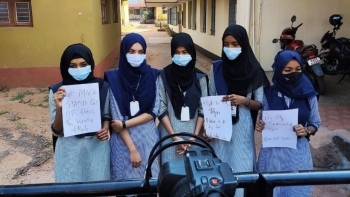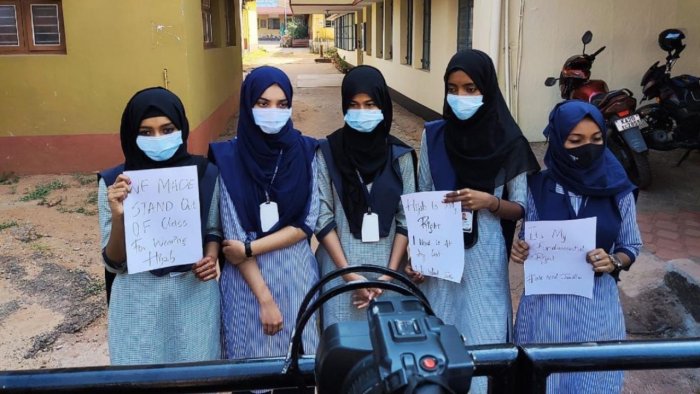
.png) John Dayal
John Dayal

Academician Ashok Swain was crisp and to the point when he commented on the Hindu right wing mobs versus hijab wearing Muslim girl students at various colleges in Karnataka. ‘A divided country, and a ruined generation,’ Prof Swain said, summing up what a piece of cloth could do when used as a head-dress by the young women of a religious minority in a country systematically polarised for the last eight years by the Rashtriya Swayamsewak Sangh and the man it chose in 2013 to be its face heading the national government, Mr Narendra Modi.
Islamophobia continues to be the main ingredient of the election campaign of the Bharatiya Janata Party in 2022, used deftly by Mr Modi, his Home Minister, Mr Amit Shah, and the Chief Minister of Uttar Pradesh, Mr Ajay Bhisht aka Yogi Adityanath, as they criss-cross the five states which are electing their Legislative Assemblies this spring.
The elections are the backdrop in which the flare-up occurred in Karnataka, which could have well spread to north India if this was a general election to Parliament.
But Uttar Pradesh is important for the fortunes of the Sangh, the BJP and Mr Modi. Events in distant Karnataka, particularly a confrontation between Hindus and Muslims, make for great memes, songs and slogans in the poll campaign.
The sight of a young Muslim woman in a hijab at the gates of her college in Mandya has gone viral across the globe. As a mob of young thugs, who may or may not be college students but are all attired in brand new saffron scarves, close in as a pack of baying dogs shouting religious chants, Bibi Muskan Khan, as she is now identified, bravely turns back to face them. They stop in their tracks but are still sloganeering. To every cry of Jai Shri Ram (Victory to Lord Rama), she echoes Allah-o-Akbar (God is Great). The irony is lost in translation; both are hailing a supreme being, albeit of different faiths.
Since this incident, colleges in Karnataka have been closed to quell the confrontation between Muslim students, men and women, asserting their religious identity, and their Hindu counterparts challenging this right.
It remains to be seen if they will reopen after the court order that no religious dress will be worn till a decision is taken on appeals before the Bench.
Behind the two contending groups are well-trained political forces, and trainers, and those that buy and provide those saffron scarves which are not something common in an average household even in a religious community.
The RSS through its students’ wing, the Akhil Bharatiya Vidyarthi Parishad, and Kerala’s Popular Front of India through its university wing Campus Front have for some years sought to increase their footprints in the state, seen as the gateway to other states in the Deccan.
Karnataka has not seen the confrontations that have occurred in the northern districts of Kerala. But a big boost has been given by the state government’s recent move in bringing an anti-conversion law whose main talking point is the utter criminalisation of any marital relationship between Muslim men and Hindu women — the implied ban on conversions to Christianity takes a back seat to this fierier confrontation.
The first incident to come to light was when hijab-wearing students of Udupi’s Government Pre-University College were denied entry into their classroom on December 28, 2021. The incident sparked outrage as the women belonging to Muslim community were segregated and made to sit in a separate classroom later.
The Karnataka High Court is hearing four petitions on the matter. The petitions argue that the institutions are discriminatory against Muslim students by denying them entry on the ground of them wearing a hijab. A single judge of the High Court pushed the matter to a three-member Bench. But it is evident that eventually the Supreme Court will have to decide. Chief Justice of India N. V. Ramana has said it is not for the apex court to take note till the High Court has taken its decision.
The Karnataka government has referred to observations of the Supreme Court in the case of Asha Ranjan vs State of Bihar And Others on 15 February 2017 and Bombay High Court judgment in Fathema Hussain Syed vs Bharat Education Society, among others, to justify its decision to impose a dress code.
The issue of law is not going to be the right of Muslim women to wear a hijab, the head covering, or a burqa which covers the entire body, as much as if these clothing are an “essential” part of the practice of the faith. The five points of long hair, comb, metal wrist “kada”, a kirpan or dagger, and the lower undergarment, in Sikhism and kosher meat to people following Judaism are injunctions contained in their holy texts.
Patriarchy, and there are no exceptions to this in institutionalised religions, demands modesty in women. St Paul in his several letters to the Corinthians, speaks of women and head-dresses. The Blessed Virgin is never depicted bare headed. Hindu and Sikh women in north India cover their head to some extent or the other, the extremes reaching the total coverage of the face and neck by the Ghoonghat of North India.
But attires, or facial and body hair, are not mentioned so often. The militaries of the world demand uniformity. In the West, Sikhs have fought bitter law battles to get the right to wear a turban, but have to forgo it if piloting a fighter jet or other war machine.
India and Pakistan have traditionally allowed turbans in some battalions. And while the Kashmir police allows Muslims to sport a beard, the Army still balks at this for anybody who is not a Sikh. As does the Air Force. The Navy allows its officers and men to wear a beard which must be properly trimmed and cannot go the lengths of a Karl Marx or Rabindranath Tagore, or for that matter, Mr Narendra Modi.
Just to muddy the waters a little more, the RSS through its Muslim Rashtriya Manch, which has Mr Indresh as its patron, has supported Muskan, saying hijab or 'purdah' is a part of Indian culture. Anil Singh, the state coordinator, told reporters, "She is a daughter and sister of our community. We stand by her in her hour of crisis." And in faraway Afghanistan, the Taliban deputy spokesman Inamullah Samangani thought they will make some headlines praising the Karnataka girls for standing up for the “Islamic values.”
Indian jurisprudence scholar, Saif Mahmood, discounts all this. “Be under no illusion -- this is not about the hijab. It is about communal hate and intimidation of women. It's a pity that the High Court couldn't see this. In refusing to grant interim relief (including appropriate directions to the police), which he could have done even without deciding whether hijab is a Constitutionally protected 'essential religious practice', the Judge has abdicated his judicial obligation. “I personally do not believe that hijab is essential to Islam but, as I have said above, what is happening in Karnataka is not about that,” Mahmood said.
Gender activists have said the ban on hijabs in classrooms and campuses, that has begun in coastal Karnataka and threatens to spread to other states, is a hate crime. “Hindu supremacists lynch/segregate/boycott Muslims on various pretexts -- beef, Muslims’ collective prayers, azaan, skull cap, Urdu language. Hijab is only the latest pretext to impose apartheid on Muslim women.”
Activist Vidya Dinker recalls that till this controversy started, many women students routinely wore the head-dress in class.
Rulebooks in at least one of the Udupi colleges allowed Muslim women to wear hijabs as long as they matched the colour of the uniform. Other activists say the only purpose of the saffron stoles worn by the Sangh young men, and some women, “were to achieve a ban on the hijab and intimidate Muslim women.”
Almost everyone has condemned the decision of some colleges to allow the hijab-wearing students to enter the colleges but making them sit in separate classrooms, and not with other students. Making hijab-wearing students sit in separate classrooms or move from colleges of their choice to Muslim-run colleges is nothing but apartheid, they say.
A little of this controversy will be familiar to Catholic schools. In the past, Madhya Pradesh used to frequently see Catholic school managements at odds with parents, religious groups and sometimes with the police. This reporter recalls such a controversy where school authorities were questioned by the police after a complaint that it had banned Sikh students in the senior classes from wearing turban. A student had worn a patka, a head kerchief, in the lower classes but switched to a turban in the 10th grade.
Karnataka Chief Minister Basavaraj Bommai’s leadership is very shaky, and with Assembly elections in 2023, there is disquiet among BJP MLAs. In fact, Bommai, who was in Delhi when the hijab incidents were taking place in the state, has not had a moment’s respite since he took over from B.S. Yediyurappa who resigned on July 26, 2021. His own people call him a temporary Chief Minister.
Karnataka is among the few states in India where the Congress is strong at the grassroots level. The stakes are very high. Bommai’s answer has been to try and outdo the Sangh. The sudden decision to enact an anti-conversion law was part of this saffron package.